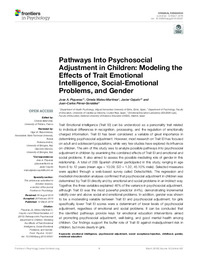Título :
Pathways Into Psychosocial Adjustment in Children: Modeling the Effects of Trait Emotional Intelligence, Social-Emotional Problems, and Gender |
Autor :
Piqueras, Jose A
Mateu-Martínez, Ornela 
Cejudo, Javier 
Pérez-González, Juan Carlos |
Editor :
Frontiers Media |
Departamento:
Departamentos de la UMH::Psicología de la Salud |
Fecha de publicación:
2019-03-12 |
URI :
https://hdl.handle.net/11000/36029 |
Resumen :
Trait Emotional intelligence (Trait EI) can be understood as a personality trait related
to individual differences in recognition, processing, and the regulation of emotionally
charged information. Trait EI has been considered a variable of great importance in
determining psychosocial adjustment. However, most research on Trait EI has focused
on adult and adolescent populations, while very few studies have explored its influence
on children. The aim of this study was to analyze possible pathways into psychosocial
adjustment in children by examining the combined effects of Trait EI and emotional and
social problems. It also aimed to assess the possible mediating role of gender in this
relationship. A total of 268 Spanish children participated in this study, ranging in age
from 8 to 12 years (mean age = 10.09, SD = 1.32, 45.10% male). Selected measures
were applied through a web-based survey called DetectaWeb. The regression and
mediation/moderation analyses confirmed that psychosocial adjustment in children was
determined by Trait EI directly and by emotional and social problems in an indirect way.
Together, the three variables explained 46% of the variance in psychosocial adjustment,
although Trait EI was the most powerful predictor (44%), demonstrating incremental
validity over and above social and emotional problems. In addition, gender was shown
to be a moderating variable between Trait EI and psychosocial adjustment; for girls
specifically, lower Trait EI scores were a determinant of lower levels of psychosocial
adjustment, regardless of emotional and social problems. It can be concluded that
the identified pathways provide keys for emotional education interventions aimed
at promoting psychosocial adjustment, well-being, and good mental health among
children. Our findings support the buffer role of Trait EI against maladjustment risk in
children, but more clearly in girls.
|
Palabras clave/Materias:
emotional intelligence
psychosocial adjustment
social acceptance/rejection
childhood
gender
emotional education |
Área de conocimiento :
CDU: Filosofía y psicología: Psicología |
Tipo de documento :
info:eu-repo/semantics/article |
Derechos de acceso:
info:eu-repo/semantics/openAccess |
DOI :
https://doi.org/10.3389/fpsyg.2019.00507 |
Aparece en las colecciones:
Artículos- Psicología de la Salud
|

 La licencia se describe como: Atribución-NonComercial-NoDerivada 4.0 Internacional.
La licencia se describe como: Atribución-NonComercial-NoDerivada 4.0 Internacional.
.png)